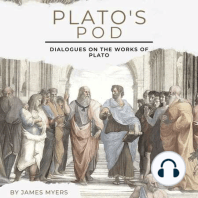115 min listen

Dialogue on The Parmenides, Session 1: The One and the Many
Dialogue on The Parmenides, Session 1: The One and the Many
ratings:
Length:
111 minutes
Released:
Jun 11, 2022
Format:
Podcast episode
Description
In the first of two sessions on the Parmenides, members of the Toronto Philosophy, Calgary Philosophy, and Chicago Philosophy Meetup groups met on June 5, 2022 to discuss the first part of Plato’s most enigmatic dialogue. What, exactly, is “the One” as the revered philosopher Parmenides describes universal being, and is it different from “not many” which are the words that Xeno attributes to all of existence. Does it matter, if there is a difference or not?Numerous points of logic emerge as Parmenides and Xeno train the young Socrates in the art of dialectic, to identify the first principle of a thing. Parmenides advises Socrates to identify as distinct one thing, and then to test the distinction so made by hypothesizing the consequences of the many in relation to themselves and in relation to the one, and of the one in relation to itself and in relation to the many. Such is the only logical means to achieve a full view of the truth, Parmenides states, and in our discussion we explored the nature of logic itself in relation to being and non-being.Do we think that we are part of one universe, or of a multiverse? Is logic ultimately a single universal form or, as Parmenides asks Socrates by analogy, is it like a sail covering many people who obtain either a part of the whole or the whole of the sail itself? This led to a discussion of what has become famously known as the “third man argument” arising in Plato’s Parmenides, referring the possibility of an infinite regress in logic as we attempt to identify the origin of a thing. Is there an absolute truth in the matter, as one participant asked, and can it ever be proven empirically? It’s an important question, among others, that we will explore in our second session on the Parmenides, as we ponder the possible universality of its conclusion that “if the one is not, nothing is.”
Released:
Jun 11, 2022
Format:
Podcast episode
Titles in the series (59)
Dialogue on The Republic, Session 4: Philosopher Rulers by Plato's Pod: Dialogues on the works of Plato